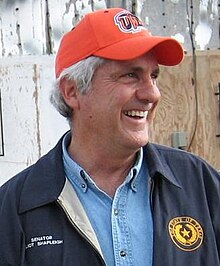Eliot Shapleigh
| Eliot Shapleigh | |
|---|---|
 |
|
| Member of the Texas Senate from the 29th district |
|
|
In office January 14, 1997 – January 17, 2011 |
|
| Preceded by | Peggy Rosson |
| Succeeded by | José R. Rodríguez |
| Personal details | |
| Born | November 11, 1952 El Paso, Texas |
| Political party | Democratic |
| Residence | El Paso, Texas |
| Alma mater | Rice University, University of Texas |
| Profession | Attorney |
| Religion | Episcopalian |
Eliot Shapleigh (born November 11, 1952) is a politician from the state of Texas, who represented the state's 29th Senatorial District, which comprises the majority of El Paso County, from 1997 to 2011. He announced on October 16, 2009 that he will not run for re-election in 2010. When asked if he will run for another office he indicated that he is undecided, though suggested he will not run for Congress.
Eliot Shapleigh was born and raised in El Paso. He has lived and traveled extensively in Mexico, and is a fluent Spanish speaker today. Senator Shapleigh graduated from Rice University in 1974 and served in the Peace Corps in Sierra Leone, West Africa until 1977. He then attended The University of Texas School of Law, graduating in 1981. In 1983, Senator Shapleigh founded his own law firm with two partners and today is the managing partner of the Shapleigh Law Firm, PC.
Senator Shapleigh currently resides in El Paso, Texas.
In 1992, Senator Shapleigh joined with hundreds of other progressive El Paso civic leaders to found Unite El Paso. This group of emerging leaders wanted to improve the per capita income in El Paso and create a viable economic model for future growth. From the 1950s, when El Paso’s per capita income levels were 20 percent higher than the Texas average, El Paso's per capita income level began a steep decline. By 2000, levels had fallen to 30 percent below the state average.
Unite El Paso successfully identified major new initiatives to reverse this decline and create a consensus vision for a new, more prosperous El Paso. To launch that vision as one of several initiatives, the group defined a goal of a new four-year medical school as the anchor of a Medical Center of the Americas.
In 1994, Senator Shapleigh, at the request of Judge Edward Marquez of the 65th District Court, was sworn in as an ad litem for the El Paso Court of Inquiry. Several prominent El Paso lawyers joined Judge Marquez to investigate whether the constitutional rights of the citizens of El Paso had been denied due to historically inadequate funding in the areas of transportation, mental health, and nutrition. Judge Marquez later issued an historic and groundbreaking report that identified significant disparities in funding that affected border economic and educational outcomes. Among the several findings in the report, some later became important statewide issues, including state highway funding. In 1999, then Texas Comptroller John Sharp issued a report outlining the various inequities faced by Texas border communities when compared to the rest of the state.
...
Wikipedia
